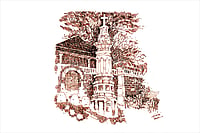Gladson Dungdung (fourth from left) was still in school when his parents were ambushed and killed over a land-related feud. Dungdung, who belongs to the Kharia Adivasi community in Jharkhand, had no option but to fend for himself. He was taken in by a relative, but had to arrange for his own school uniform, books, clothes and sundry essentials.
Dungdung took on the challenge. He worked sometimes as a daily wage labourer, a cycle mechanic and a helper in a tea shop, even while he continued his studies. After he put himself through school, which assembled under a tree in his village, Dungdung’s challenged social and financial circumstances posed more obstacles in his path.
Inability to gather a sum of Rs 250 stalled his college education for a couple of years, forcing him to migrate to Patna, where his elder sister worked in an NGO specialising in the area of land rights.
Land rights was an issue of emotional concern for Dungdung. His family was hurriedly displaced in 1980 to make way for an irrigation project at the Chhinda River in Simdega district. Their brutal death was also linked to a land feud that was related to their displacement.
Migration to Patna, brought him another chapter of trauma. “At Patna, when I was around 16 years old, I encountered untouchability and caste-based atrocities for first time in my life. We were working with the Musahar community, who are considered as the lowest rung of social and caste strata in Bihar. They are viewed as the most untouchable. But members of this community treated us tribals like we were even more untouchable than them,” he says.
Dungdung was selected for an internship programme in a public advocacy institute in Pune, where he slipped into an insecure shell after he was unable to grasp the course taught in the English language.
“One of the resource persons used the word ‘anthropology’ in a lecture. I did not even know what it meant. I thought perhaps I was the wrong person in the right place,” he says.
Driven to the wall, Dungdung resolved to climb his way out of the crisis. He started reading books written in English and only started conversing with his friends and colleagues in that language in order to master it.
The ‘powering through’ strategy appears to have worked for the best. Dungdung is now an activist, researcher, writer, publisher and
public speaker.
As a founder of ‘Adivasi Publication’, the 42-year-old has already published more than two dozen books, most of them authored by himself.
The intern, who could not converse in English, has also authored more than a score books in English and Hindi, apart from writing more than 500 articles related to human rights issues, Adivasi rights, displacement, politics and social change.
He has spoken at a couple of international seminars and conferences in Europe and served as an honorary member in the Assessment and Monitoring Authority under the Planning Commission of India. In 2014, he was awarded the Samata Ratan Award, 2014, for his extraordinary work within the adivasi communities of India.
(This appeared in the print edition as "Never Give Up")
Liked the story? Do you or your friends have a similar story to share about 'ordinary' Indians making a difference to the community? Write to us. If your story is as compelling, we'll feature it online. Click here to submit.



























